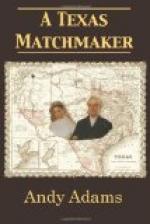But when cattle and horses no longer served as a subject, and the wide expanse of flowery mesa, studded here and there with Spanish daggers whose creamy flowers nodded to us as we passed, ceased to interest us, we turned to the ever interesting subject of sweethearts. But try as I might, I could never wring any confession from her which even suggested a preference among her string of admirers. On the other hand, when she twitted me about Esther, I proudly plead guilty of a Platonic friendship which some day I hoped would ripen into something more permanent, fully realizing that the very first time these two chums met there would be an interchange of confidences. And in the full knowledge that during these whispered admissions the truth would be revealed, I stoutly denied that Esther and I were even betrothed.
But during that morning’s ride I made a friend and ally of Frances Vaux. There was some talk of a tournament to be held during the summer at Campbellton on the Atascosa. She promised that she would detain Esther for it and find a way to send me word, and we would make up a party and attend it together. I had never been present at any of these pastoral tourneys and was hopeful that one would be held within reach of our ranch, for I had heard a great deal about them and was anxious to see one. But this was only one of several social outings which she outlined as on her summer programme, to all of which I was cordially invited as a member of her party. There was to be a dance on St. John’s Day at the Mission, a barbecue in June on the San Miguel, and other local meets for the summer and early fall. By the time we reached the ranch, I was just beginning to realize that, socially, Shepherd’s Ferry and the Nueces was a poky place.
The next morning I returned to Las Palomas. The horse-breaking was nearing an end. During the month of May we went into camp on a new tract of land which had been recently acquired, to build a tank on a dry arroyo which crossed this last landed addition to the ranch. It was a commercial peculiarity of Uncle Lance to acquire land but never to part with it under any consideration. To a certain extent, cows and land had become his religion, and whenever either, adjoining Las Palomas, was for sale, they were looked upon as a safe bank of deposit for any surplus funds. The last tract thus secured was dry, but by damming the arroyo we could store water in this tank or reservoir to tide over the dry spells. All the Mexican help on the ranch was put to work with wheelbarrows, while six mule teams ploughed, scraped, and hauled rock, one four-mule team being constantly employed in hauling water over ten miles for camp and stock purposes. This dry stream ran water, when conditions were favorable, several months in the year, and by building the tank our cattle capacity would be largely increased.




